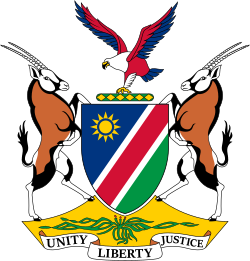 |
|---|
The Ministry of Sport, Youth and National Service (MSYNS) was a department of the Namibian government. It was established as Ministry of Youth and Sport in 1991 when sport was split off from the Ministry of Education. The first minister of education, culture and sport was Nahas Angula, serving from independence in 1990. [1] The first minister of youth and sport was Pendukeni Iivula-Ithana.
Contents
MSYNS appointed, directed, and took advice from, the Namibia Sports Commission. [2]
The ministry was dissolved in 2000; The youth portfolio was discontinued, and sports was added to the Ministry of Basic Education. [3] In 2005 it was reestablished as Ministry of Youth, National Service, Sport and Culture. Culture was again given back to the Ministry of Education in 2015, and the youth and sport ministry got its latest name. The ministry was again disestablished in 2025. The portfolio of national service was discontinued—Namibia never had a national service. Youth and sport were given to the education ministry. [4] The current [update] Minister of Education, Innovation, Youth, Sport, Arts and Culture is Sanet Steenkamp.
